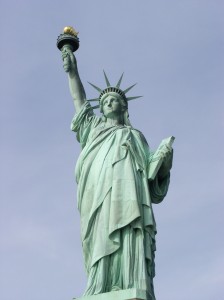In a few hours, my husband will wake up before dawn, lace up his running shoes, pin on his number, and join 60,000 other people in running the largest 10k in the world.
My girls and I will also get up early, but we’ll be packing our camping chairs and a cooler and dusting off the signs we made five years ago for his second race. “Go Go Daddy-O” says one of the signs. We’ll meet friends and camp out for several hours just watching the throngs of humanity go by, and by, and by. It’s quite an amazing sight. We’ll scan the faces for “Daddy-O,” and suddenly he apparates, like Harry Potter, almost right in front of us. We’ll take a quick photograph and get a sweaty hug and he’ll be on his way again.
My husband is an immigrant. He is also a US citizen. Because he’s white and English is his first (and only) language, he’s the type that most people make exceptions for in their minds. He’s ‘desirable.’ Most Americans think of English people as bringing up the place. On the day he became a US citizen, he was one face in a sea of people from around the world who took the oath. It’s quite an amazing sight.
I’m reminded of my father’s grandmother, who got on a boat bound for America with her family when she was 11. They were on the boat for many weeks. Her small brother fell ill on the journey and when they finally reached US soil, he was refused entry. He and their mother, my great-great grandmother, had to get back on the boat and return to Norway. My great-grandmother became the ‘mother’ of the family, as the oldest daughter, for several years until her brother and their mother were able to return and the family be reunited. It was a hard life, clearing stumps after the logging companies had come through, and starting a farm from scratch in a new country.
Immigrants today go through so much to come to America. Becoming a citizen was a long, expensive process for my husband. I can’t imagine how difficult it was for those people from Burkina Faso, Serbia, Jamaica, Colombia, Cambodia that we shared that day with at the immigration office. Learning the language, navigating the requirements, studying for the test; it seems so overwhelming. But our country offers them something that makes it worth the sacrifice.
;
Not like the brazen giant of Greek fame,
With conquering limbs astride from land to land;
Here at our sea-washed, sunset gates shall stand
A mighty woman with a torch, whose flame
Is the imprisoned lightning, and her name
Mother of Exiles. From her beacon-hand
Glows world-wide welcome; her mild eyes command
The air-bridged harbor that twin cities frame.
“Keep, ancient lands, your storied pomp!” cries she
With silent lips. “Give me your tired, your poor,
Your huddled masses yearning to breathe free,
The wretched refuse of your teeming shore.
Send these, the homeless, tempest-tost to me,
I lift my lamp beside the golden door!”


Great post, Claire. It always amazes me to be reminded that we, as a country, have created and continue to create policies that value some human lives over others. If you’re from certain countries, we want you to join our ranks more than if you’re from other countries. Wow. That seems totally antithetical to “American” values.
Claire, I’ve been thinking about this post all week because my husband and I are going through the same, expensive and surprisingly difficult, process in reverse and getting close to gettting our English citizenship. I tutor a Polish woman and we often compare notes on our experiences as immigrants, but it is never lost on me that she has had a far more difficult road as a non-English speaker (when she first arrived). She has also been on the recieving end of a lot more xenophobia.
I wish I would have noticed this post a few weeks ago. Immigration is a topic close to my heart, being one of the many immigrants to this country. It’s been a really interesting (and hard!) experience in many ways. I’ve also noticed how differently the treatment is for those immigrants of European origin (like me) vs. those from “less desirable” nations. I’ve particularly noticed it when I listened to conversations and debates regarding immigration (and illegal immigration).
I think for those from nations with little freedom, wealth or hope, being able to come to America is a great opportunity. For myself though, it’s been rather frustrating many times. Mainly it’s been hard whenever I hear the notion that I should be indefinitely grateful to be able to now live in complete freedom – like I came from some poor, oppressive country (Germany). I personally have often felt that I’ve given up more freedoms and conveniences than I’ve gained by immigrating to the US. But a lot of people, particularly those who’ve never even left the US, have a hard time understanding that.